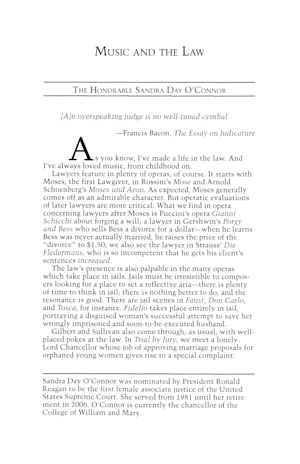By Justice Sandra Day O'Connor
Music and the Law
January 2, 2005

Article Text
(Excerpt)
[A]n overspeaking judge is no well-tuned cymbal.
-Francis Bacon, The Essay on Judicature
As you know, I've made a life in the law. And I've always loved music, from childhood on.
Lawyers feature in plenty of operas, of course. It starts with Moses, the first Lawgiver, in Rossini's Mose and Arnold Schoenberg's Moses und Aron. As expected, Moses generally comes off as an admirable character. But operatic evaluations of later lawyers are more critical. What we find in opera concerning lawyers after Moses is Puccini's opera Gianni Schicchi about forging a will; a lawyer in Gershwin's Porgy and Bess who sells Bess a divorce for a dollar-when he learns Bess was never actually married, he raises the price of the "divorce" to $1.50; we also see the lawyer in Strauss' Die Fledermaus,who is so incompetent that he gets his client's sentences increased.
The law's presence is also palpable in the many operas which take place in jails. Jails must be irresistible to composers looking for a place to set a reflective aria-there is plenty of time to think in jail; there is nothing better to do; and the resonance is good. There are jail scenes in Faust, Don Carlo, and Tosca, for instance. Fideliot akes place entirely in jail, portraying a disguised woman's successful attempt to save her wrongly imprisoned and soon-to-be-executed husband.
Gilbert and Sullivan also come through, as usual, with well placed pokes at the law. In Trial by fury,we meet a lonely Lord Chancellor whose job of approving
